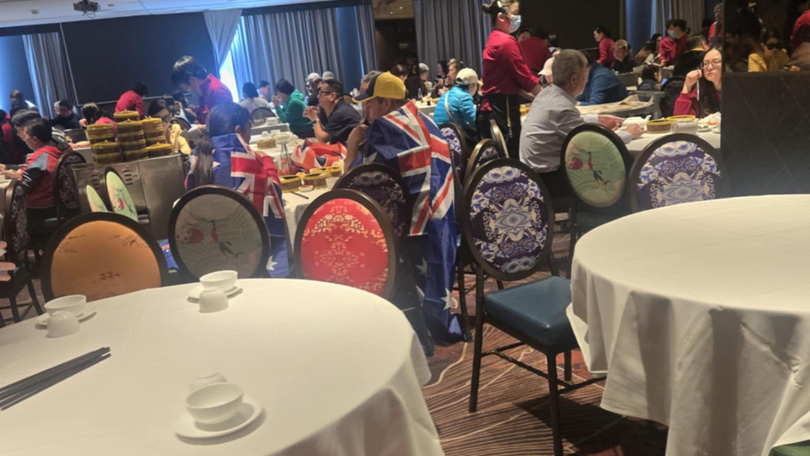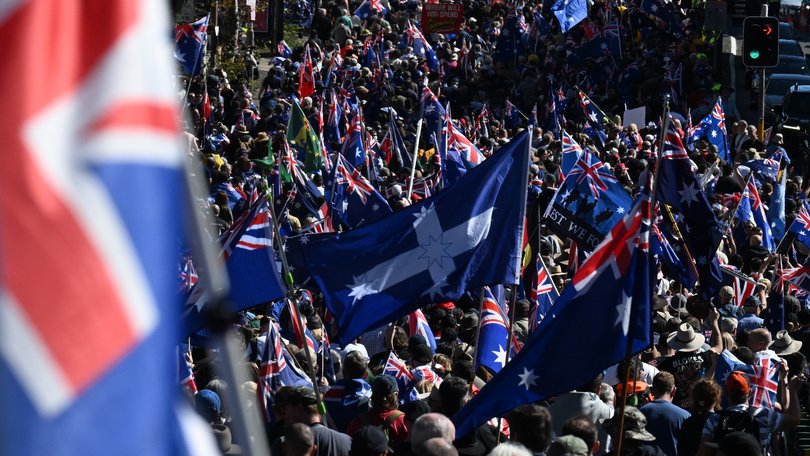Anti-immigration protesters slammed after dining at yum cha restaurant following Sydney rally
‘Chinese meal and his Chinese-made flag! My man is doing his part for the Chinese economy.’

Anti-immigration protesters have drawn criticism after being spotted dining at a yum cha restaurant after the rally.
Tens of thousands of people took to the streets for the March For Australia demonstrations in Sydney, Melbourne, Adelaide, Brisbane and Canberra on Sunday.
One photo shared on social media showed three people with Australian flags seated inside a yum cha restaurant in Sydney’s CBD.
Sign up to The Nightly's newsletters.
Get the first look at the digital newspaper, curated daily stories and breaking headlines delivered to your inbox.
By continuing you agree to our Terms and Privacy Policy.The image quickly drew ridicule online.
“LOL …. Such hypocrisy,” one user wrote.
“Multiculturalism has gone too far, pass the soy sauce,” another commented sarcastically.
“I’ll take the sweet and sour pork and get out of me country!” a third joked.
“They’re literally the same as the MAGAs we have in the US Global hypocrisy,” another said.
“Chinese meal and his Chinese-made flag! My man is doing his part for the Chinese economy,” one commenter added.
“If you don’t want immigration you don’t get the benefits of that,” another wrote.

But some defended the protesters, arguing it showed they were not opposed to immigration altogether, only to high levels of intake.
“This is put up as hypocrisy, but backfires because it’s evidence they’re not anti-immigration, just mass immigration, which is what the rally purported to be,” one person argued.
“Saying we need to massively slow immigration doesn’t mean you hate Asians. It just means you think Australians should have a chance of getting their own home, before we import more yoga instructors and dog walkers,” another said.
“I don’t see the conflict here. I know Asians who think the immigration levels are off the charts. It’s not black and white,” added another.
Western Sydney University Professor Gregory Noble said the photo revealed “a degree of irony at least and hypocrisy at worst”, but argued a deeper issue was at play.
“It reflects a lack of understanding of Australia’s past and its reliance on immigration as a nation- and economy-building strategy since British colonisation,” Noble said.
He added that while some people may have legitimate concerns about immigration, their voices were overshadowed by far-right groups.
“It wasn’t clear whether there was a consensus amongst those marching about what they see as the problem and why,” he said.
“It is also evidence of the growing public boldness of the radical right in Australia, and their use of Trump-like strategies.”

Monash University Associate Professor Ben Wellings said the protest reflected a wider mistrust of established politics.
“The anti-immigration protests appeared to draw together groups and individuals with a wide range of views but many of whom share some sort of mistrust of established politics,” he said.
“This anger and disaffection — sometimes based on misinformation — can be spread via social media which amplifies outrage.”
Sustainable Population Australia (SPA) said it had “officially distanced itself” from the March for Australia, claiming the tone set by organisers invited infiltration from extreme groups.
SPA National President Peter Strachan said he and others were discouraged from attending the rally “because of the likelihood that its agenda would be hijacked by a small group of unsavoury and noisy nationalists”.
“A survey shows that while most Australians like immigration, they think that the numbers are too high,” Strachan said.
“The recent pace of net overseas migration at over 350,000 per year is well above the sustainable 70,000 per year that worked well over the four decades leading to 2003.
The SPA’s concerns focus on the environment, water security, cost of living and the housing crisis.
It supports reducing the overall immigration intake, but not ending it entirely.
Originally published on 7NEWS
